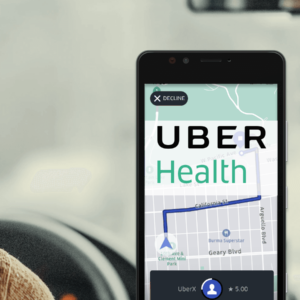One of us is an economist, the other a doctor, and both of us look forward to uberizing healthcare. Healthcare will be the better for absorbing some of the technologies that made Uber a great success story. In the popular imagination, “uberization” has many meanings, so we’ll be more specific.
Uber created a fast, convenient means of requesting that an automobile pick you up at some spot. A Google search on “uberization of medicine” and “uberization of healthcare” suggests that many people using these terms focus mostly on the ease and speed of making appointments and reaching doctors. The popular KevinMD.com site, for example, says that Uberization will, “bring consultations by physicians to patients via their smartphones, on-demand, wherever and whenever they request them.” But that’s only part of Uber’s success. In multiple ways, Uber offered markedly improved quality over traditional taxis.
As we’ve written elsewhere, Uber makes it easy for anyone with a smartphone to summon a ride with just a few taps. But Uber also accumulates vast data on roadways and destinations to improve the quality of the ride. During peak-demand periods, it raises prices to minimize wait times and smooth patterns of demand and supply. It provides riders with second-by-second progress on the car’s whereabouts before and during the ride. It offers drivers real-time advice on optimal routes—with a constant awareness of traffic jams, accidents, and closures—giving novice drivers virtual geographic expertise that would otherwise take years to accumulate. (See “Gigs, Jobs, and Smart Machines,” by Graboyes, on Uber versus London cabbies.)
Uber enables rapid evaluation of driver and passenger quality, expedites payments, and provides passengers and drivers with precise records of the times and route. Riders and drivers receive information on one another before they meet—imparting a degree of safety that taxis cannot replicate. And Uber makes all of these processes highly intuitive to both driver and rider.
Uberization of healthcare means the development of digital technologies that similarly ease the process of connecting patients and providers, expedite their care, offer clinical advice along the way, simplify record-keeping and payments, enable patients and providers to monitor progress and results, and accumulate indicators of quality and safety—all in intuitive, convenient ways.
We’re confident that in the not-so-distant future, a 52-year-old man who feels thumping in his chest will open a medical smartphone app and be connected in seconds to a qualified healthcare professional. Not only will this clinician have immediate access to a fully digitized record of the patient’s past medical history, but also the results of vital signs and an EKG transmitted by sensors from the patient’s smartwatch. Algorithms will incorporate the patient’s past and current conditions into the provider’s data. The system will generate a diagnosis-and-treatment plan.
If the patient needs prompt medical care, an ambulance will be dispatched to bring him to an emergency room. If the situation is less dire, an Uber driven by a medic will be on its way. If further consultation with a specialist is advisable, that can be accomplished within minutes by telemedicine.
Pregnant women with cramps, diabetics with vomiting, and children with a cough and fever will get similarly rapid attention, regardless of the time of day or night. The medical organization to which the patient subscribes will have participating healthcare providers around the globe in different time zones. There will always be awake, alert, well-trained, certified clinicians available when the patient opens the app. Importantly, patient satisfaction will be continuously monitored. Competition between different healthcare plans will help keeps costs down and quality high.
Will patients and providers want uberization? We can only respond with a question: In 2008, how many Americans wanted a button on their cellphones that would summon a total stranger, driving his own car as a side gig, to pick them up late at night in a dicey neighborhood and drive them to their home? Very likely, few would have said “yes.” But Uber correctly gambled otherwise.
To quote another high-tech entrepreneur, Apple CEO Tim Cook, “Our whole role in life is to give you something you didn’t know you wanted. And then once you get it, you can’t imagine your life without it.”

